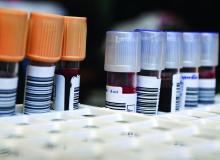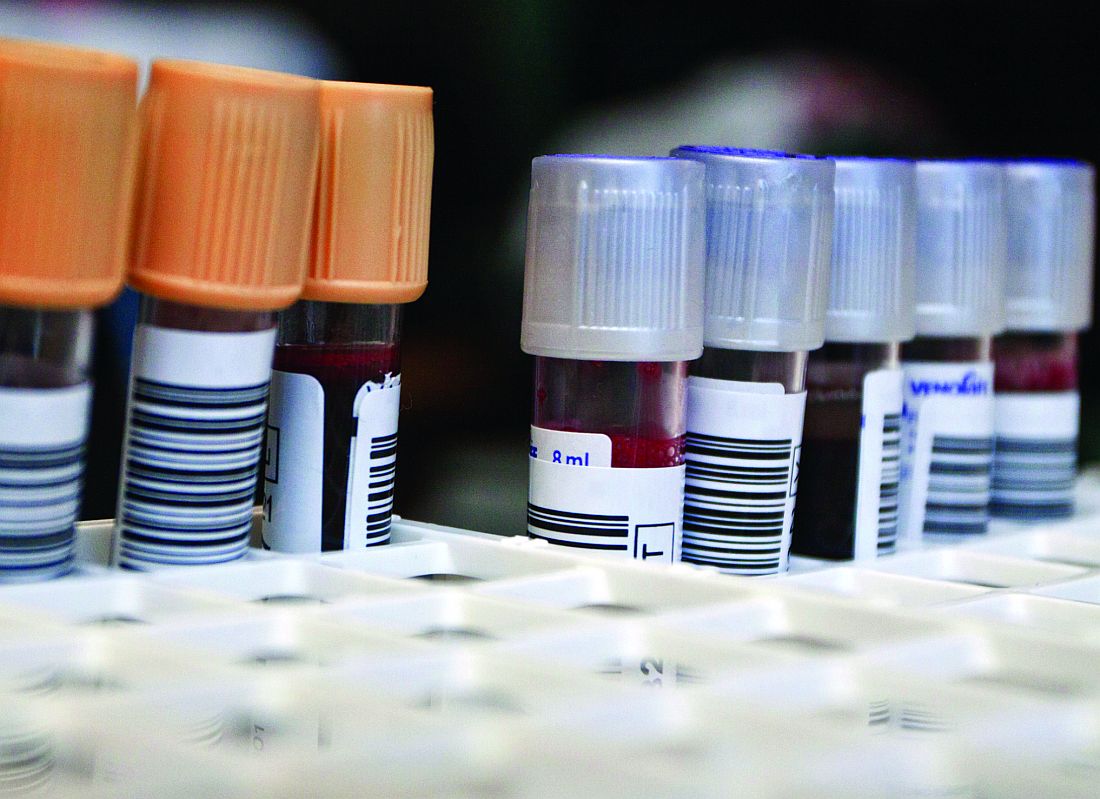User login
A newly developed gene expression classifier may be able to identify rheumatoid arthritis patients who are unlikely to benefit from methotrexate, according to an analysis of blood samples from patients who had just begun the drug.
“This study highlights the potential of early treatment biomarker monitoring in RA and raises important questions regarding acceptable levels of performance for complementary diagnostic testing,” wrote lead author Darren Plant, PhD, of the University of Manchester (England), and his coauthors. The study was published in Arthritis & Rheumatology.
The study analyzed 85 participants in the Rheumatoid Arthritis Medication Study, a U.K.-based longitudinal observational study of RA patients taking methotrexate for the first time, and classified them as either good responders (n = 42) or nonresponders (n = 43) after 6 months on the drug, based on European League Against Rheumatism response criteria. Dr. Plant and his colleagues then performed gene expression profiling on whole-blood samples from those participants, collected before treatment and after 4 weeks on methotrexate.
Ultimately, pathway analysis indicated an overrepresentation of type 1 interferon signaling pathway genes in nonresponsive patients at both pretreatment (P = 2.8 x 10-25) and 4 weeks (P = 4.9 x 10-28). As such, the coauthors “developed a gene expression classifier that could potentially provide an early response biomarker of methotrexate inefficacy” at 6 months based on the gene expression ratio between 4 weeks and pretreatment, which yielded an area under the receiver operating characteristic curve (ROC AUC) of 0.78. This was proven stable in cross validation and superior to models including clinical covariates (ROC AUC = 0.65).
The authors did not replicate the results in an independent cohort, but the authors noted that the “utility of a gene expression classifier of methotrexate nonresponse now requires validation, not only in independent samples but also using independent technology.”
The study was also potentially limited by the fact that the patients at baseline were atypical in having a long disease duration at a median of 6-9 years but relatively low disease activity, based on a mean 28-joint Disease Activity Score (DAS28) of 4.8 in good responders and 4.0 in nonresponders. The authors also acknowledged both the objective and subjective nature of the DAS28 and its components in approximating disease activity. The authors also did not include a negative predictive value in their analysis, which would have been useful in considering the value of the test.
The study was jointly funded by Pfizer, the Medical Research Council, and Arthritis Research UK. No conflicts of interest were reported.
SOURCE: Plant D et al. Arthritis Rheumatol. 2019 Jan 7. doi: 10.1002/art.40810.
A newly developed gene expression classifier may be able to identify rheumatoid arthritis patients who are unlikely to benefit from methotrexate, according to an analysis of blood samples from patients who had just begun the drug.
“This study highlights the potential of early treatment biomarker monitoring in RA and raises important questions regarding acceptable levels of performance for complementary diagnostic testing,” wrote lead author Darren Plant, PhD, of the University of Manchester (England), and his coauthors. The study was published in Arthritis & Rheumatology.
The study analyzed 85 participants in the Rheumatoid Arthritis Medication Study, a U.K.-based longitudinal observational study of RA patients taking methotrexate for the first time, and classified them as either good responders (n = 42) or nonresponders (n = 43) after 6 months on the drug, based on European League Against Rheumatism response criteria. Dr. Plant and his colleagues then performed gene expression profiling on whole-blood samples from those participants, collected before treatment and after 4 weeks on methotrexate.
Ultimately, pathway analysis indicated an overrepresentation of type 1 interferon signaling pathway genes in nonresponsive patients at both pretreatment (P = 2.8 x 10-25) and 4 weeks (P = 4.9 x 10-28). As such, the coauthors “developed a gene expression classifier that could potentially provide an early response biomarker of methotrexate inefficacy” at 6 months based on the gene expression ratio between 4 weeks and pretreatment, which yielded an area under the receiver operating characteristic curve (ROC AUC) of 0.78. This was proven stable in cross validation and superior to models including clinical covariates (ROC AUC = 0.65).
The authors did not replicate the results in an independent cohort, but the authors noted that the “utility of a gene expression classifier of methotrexate nonresponse now requires validation, not only in independent samples but also using independent technology.”
The study was also potentially limited by the fact that the patients at baseline were atypical in having a long disease duration at a median of 6-9 years but relatively low disease activity, based on a mean 28-joint Disease Activity Score (DAS28) of 4.8 in good responders and 4.0 in nonresponders. The authors also acknowledged both the objective and subjective nature of the DAS28 and its components in approximating disease activity. The authors also did not include a negative predictive value in their analysis, which would have been useful in considering the value of the test.
The study was jointly funded by Pfizer, the Medical Research Council, and Arthritis Research UK. No conflicts of interest were reported.
SOURCE: Plant D et al. Arthritis Rheumatol. 2019 Jan 7. doi: 10.1002/art.40810.
A newly developed gene expression classifier may be able to identify rheumatoid arthritis patients who are unlikely to benefit from methotrexate, according to an analysis of blood samples from patients who had just begun the drug.
“This study highlights the potential of early treatment biomarker monitoring in RA and raises important questions regarding acceptable levels of performance for complementary diagnostic testing,” wrote lead author Darren Plant, PhD, of the University of Manchester (England), and his coauthors. The study was published in Arthritis & Rheumatology.
The study analyzed 85 participants in the Rheumatoid Arthritis Medication Study, a U.K.-based longitudinal observational study of RA patients taking methotrexate for the first time, and classified them as either good responders (n = 42) or nonresponders (n = 43) after 6 months on the drug, based on European League Against Rheumatism response criteria. Dr. Plant and his colleagues then performed gene expression profiling on whole-blood samples from those participants, collected before treatment and after 4 weeks on methotrexate.
Ultimately, pathway analysis indicated an overrepresentation of type 1 interferon signaling pathway genes in nonresponsive patients at both pretreatment (P = 2.8 x 10-25) and 4 weeks (P = 4.9 x 10-28). As such, the coauthors “developed a gene expression classifier that could potentially provide an early response biomarker of methotrexate inefficacy” at 6 months based on the gene expression ratio between 4 weeks and pretreatment, which yielded an area under the receiver operating characteristic curve (ROC AUC) of 0.78. This was proven stable in cross validation and superior to models including clinical covariates (ROC AUC = 0.65).
The authors did not replicate the results in an independent cohort, but the authors noted that the “utility of a gene expression classifier of methotrexate nonresponse now requires validation, not only in independent samples but also using independent technology.”
The study was also potentially limited by the fact that the patients at baseline were atypical in having a long disease duration at a median of 6-9 years but relatively low disease activity, based on a mean 28-joint Disease Activity Score (DAS28) of 4.8 in good responders and 4.0 in nonresponders. The authors also acknowledged both the objective and subjective nature of the DAS28 and its components in approximating disease activity. The authors also did not include a negative predictive value in their analysis, which would have been useful in considering the value of the test.
The study was jointly funded by Pfizer, the Medical Research Council, and Arthritis Research UK. No conflicts of interest were reported.
SOURCE: Plant D et al. Arthritis Rheumatol. 2019 Jan 7. doi: 10.1002/art.40810.
FROM ARTHRITIS & RHEUMATOLOGY
Key clinical point:
Major finding: A blood test that uses a gene expression ratio between 4 weeks and pretreatment yielded a ROC AUC of 0.78 for predicting methotrexate inefficacy at 6 months.
Study details: An analysis of blood samples from 85 participants in a U.K.-based longitudinal observational study of RA patients starting methotrexate for the first time.
Disclosures: The study was jointly funded by Pfizer, the Medical Research Council, and Arthritis Research UK. No conflicts of interest were reported.
Source: Plant D et al. Arthritis Rheumatol. 2019 Jan 7. doi: 10.1002/art.40810.

